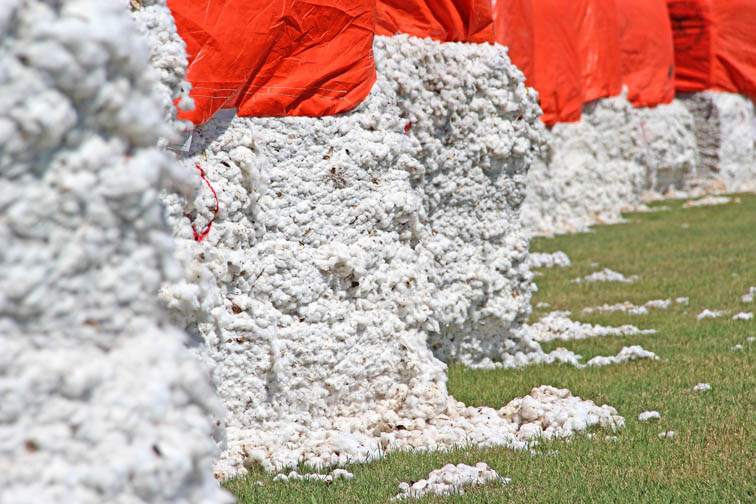
Subsidies to the world cotton industry, including direct support to production, border protection, crop insurance subsidies and minimum support price mechanisms, were estimated at $6.5 billion in 2013-14, down from a record $7.4 billon in 2012-13, according to a report by the International Cotton Advisory Committee, (http://bit.ly/1n0RH5Q).
ICAC reported cotton subsidies provided to producers in 2013-14 averaged 26 cents per pound, the same as in 2012-13. Here’s a country-by-country summary of the report, Production and Trade Policies Affecting the Cotton Industry.
China
China supports cotton production by controlling import volumes and values and by applying border protection measures based on quotas and sliding scale duties, with an effective tariff of 40 percent on cotton imported without a quota.
During the last three seasons, China implemented a system of minimum support prices by directly purchasing cotton from producers for its strategic reserve. The 2013-14 state reserve procurement price was set at $1.51 per pound.
The Chinese government recently announced that it would end its reserve building policy in 2014-15 and provide a direct subsidy to cotton producers in the Xinjiang Province with a target price of about $1.46 cents per pound. Details of the implementation of the new subsidy program remain sketchy.
The subsidy received by producers in China as a result of the government interventions is estimated at $4.8 billion in 2013-14, or 32 cents per pound, compared with $5.5 billion in 2012-13, or 34 cents per pound.
China also pays a subsidy for to growers for using high-quality planting seeds, about $150 million a year. Recently, China provided subsidies for transportation of cotton from Xinjiang to mills in eastern and southern China estimated at about $160 million per year.
All types of subsidies provided by the Chinese government are estimated at $5.1 billion in 2013-14, down from $5.8 billion in 2012-13.
United States
During 2013-14, the only subsidy effectively received by producers under the U.S. cotton program was for crop insurance. All other subsidies were unavailable because of historically high market prices.
U.S. cotton producers received about $593 million in direct payments during 2013-14, up from $580 million the year before. The direct payment, 6.67 cents per pound, is decoupled from production and is not counted as a subsidy to production by the ICAC.
Total premium subsidies for crop insurance averaged $226 million per year between 1997 and 2010. In 2011-12, total cotton crop insurance subsidies reached $819 million, or 11 cents per pound. The increase was caused by higher insurance premiums tied to higher market prices.
In 2012-13, cotton insurance subsidies declined to an estimated $562 million, or 7 cents per pound. In 2013-14 crop insurance subsidies are estimated at $453 million, or 7 cents per pound.
India
There were no payments to growers under India’s minimum support price program during 2013-14 because of high market prices. In 2013-14, the MSP for medium-staple cotton were set at 82 cents per pound.
Cotton farmers in India benefit from debt forgiveness and fertilizer subsidies from the government of India. The government supports the textile sector with a number of programs that provide direct support and soft loans.
European Union
Greece and Spain are the major cotton producers in the EU. Cotton producers receive 65 percent of EU support in the form of a single decoupled payment and the remaining 35 percent in the form of an area payment, which is coupled and considered production aid.
In 2013-14 the amount of direct subsidy to production in Greece was estimated at $274 million, compared to $262 million in 2012-13, equivalent to 44 cents per pound. The subsidy in Spain is estimated at $91 million in 2013-14, or 84 cents per pound.
Turkey
ICAC estimates that total payments to cotton producers in Turkey declined from $488 million in 2012-13 to $452 million in 2013-14 due to reduced planting.
Brazil
The minimum guarantee price is set at the equivalent of 60 cents per pound at the exchange rate prevailing at the middle of July 2014. During the past three seasons, market prices have remained above the minimum-guaranteed price.
Brazil also provides support to cotton production through subsidized credit for production, marketing and investments. It is estimated that subsidized annual credit to cotton producers averaged around $500 million during the past decade. ICAC estimates the maximum annual subsidy received by cotton growers in the form of subsidized interest averaged $75 million over the past decade.
Colombia
Direct government payments to producers in 2013-14 are estimated at $18 million, averaging 30 cents per pound. In 2012-13, direct government payments were estimated at $21 million, averaging 44 cent per pound.
West Africa
Several countries in West Africa provide subsidies to producers for cotton inputs, primarily fertilizers and planting seeds. In 2013-14, Burkina Faso provided $30 million, or 6 cents per pound, Mali provided $38 million, or 10 cents per pound, Côte d’Ivoire $14 million, or 4 cents per pound and Senegal $2 million, or 7 cents per pound.
About the Author(s)
You May Also Like






